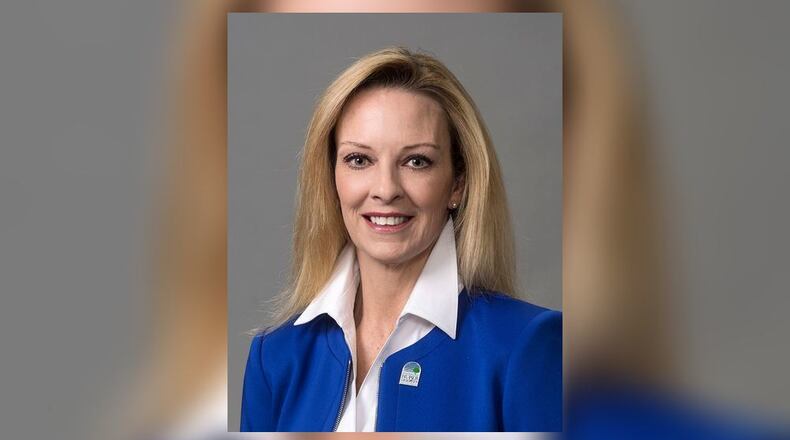ORIGINAL REPORT: Huber Heights City Council approves recall of member for ballot
McDonald said the city plans to file the appropriate paperwork with Montgomery County’s election board. McDonald, however, said he is still researching and hopes to determine by Wednesday if the plan is allowed under law.
The group seeking to remove Smith alleges she “withheld crucial information from the rest of city council that could have affected the approval of $2.4 million of taxpayer money” during debate over the city’s water pressure project.
Night of confusion
Huber Heights and elections officials face several seemingly competing requirements and realities.
When a group of petitioners seeks to recall an elected official, they must collect a specified number of signatures on a petition. Within 10 days of receiving a completed citizen petition, the clerk of council must determine if the petition is “sufficient.”
If the clerk finds the petition sufficient, the clerk must then inform council. The city charter then requires city council to pass an ordinance at its next regular meeting directing the board of elections to place the issue on the ballot “at the next general or primary election or at the next possible special election … if the next general or primary election shall not occur” within 60 days.
In this case, the next election date under the charter’s requirements is Nov. 6.
Here’s where the tension begins: Council ordinances don’t take effect for 30 days after their passage. Huber Heights city council passed the ordinance, as the charter required members to do, on Monday night, meaning the ordinance doesn’t take effect until Sept. 12. But Kelly said the Montgomery County “hard deadline” for getting petitions onto the ballot is 4 p.m. Sept. 7.
“The Huber Heights charter controls this case,” Kelly told the Dayton Daily News. “We have no control over when they submit it or when they don’t, it’s just if they submit it by Sept. 7 at 4 p.m., we’ll put it on the general election ballot.”
The text of the ordinance specifies the recall should be put on the Nov. 6 ballot, but council members raised the question of whether the recall would instead appear on the February special election — potentially, said some members, costing the city more money. Kelly estimated such a special election could cost Huber Heights around $6,000 in Montgomery County alone.
Referendum talk looms
The ordinance approving the recall, as originally drafted, would have been passed as emergency legislation, which cannot be overturned by referendum and takes immediate effect.
But council stripped the ordinance of its emergency language over concerns from Smith and Councilman Glenn Otto that doing so would prohibit citizens from taking the ordinance up for referendum.
Here, another dilemma emerges: Could a referendum seeking to overturn legislation authorizing the recall election against Smith appear on the ballot alongside Smith’s recall? And if so, what would happen if both passed?
The situation is so unusual, McDonald, the city’s law director, said Monday he simply did not yet know what would happen.
If citizens wish to overturn ordinances passed by council, they must do so within 30 days of passage. A successful referendum petition would force council to either reconsider the ordinance approving the recall or send the question to voters, who could then repeal or uphold the ordinance at a future election.
Also unclear is whether a sufficient referendum petition would appear on November’s ballot, and how elections officials would reconcile the charter’s stipulations with the realities of running an election with early voting. The charter stipulates that a referendum vote “shall be held at the next scheduled general or primary election or a special election called by council, not less than” 75 days after the ordinance is certified by election authorities.
Some Huber Heights voters live in Miami County, adding another layer of complexity to the ballot questions.
Smith defends self
Smith said she would “continue to wage the battle” against the recall, arguing she was elected “to ask tough questions about this city’s government and administration that had gone unanswered for too long; and to insist on answers to those questions.”
“The old guard in any shielded system will always fight tooth-and-nail to maintain it,” Smith wrote in a multi-paragraph statement given to reporters at the council meeting. “There is no strategy more time-tested for doing that than to remove the agitators and cast them as pariahs; as they now try to do to me through this recall petition.”
Last month, a group of citizens organized to gather enough signatures to put the removal option on the ballot. The group - named Huber Heights Ward 2 United for a Better Tomorrow PAC - is organized as a political action committee, according a the letter from the group’s organizers to the city clerk of council.
To put the measure on the ballot, the group was required to collect signatures equal to at least 15 percent of the total number of votes cast in Ward 2 in the last gubernatorial election.
Smith was elected in 2015 and began her term on Jan. 1, 2016. Her term expires Dec. 31, 2019.
More local coverage:
» 911 dispatcher reprimanded in Huber Heights dementia case
» Golf carts will be allowed on Huber Heights streets later this month
» Ohio congressman wants to legalize marijuana across U.S.
» These Dayton-area suburbs saw the largest population gains
About the Author
